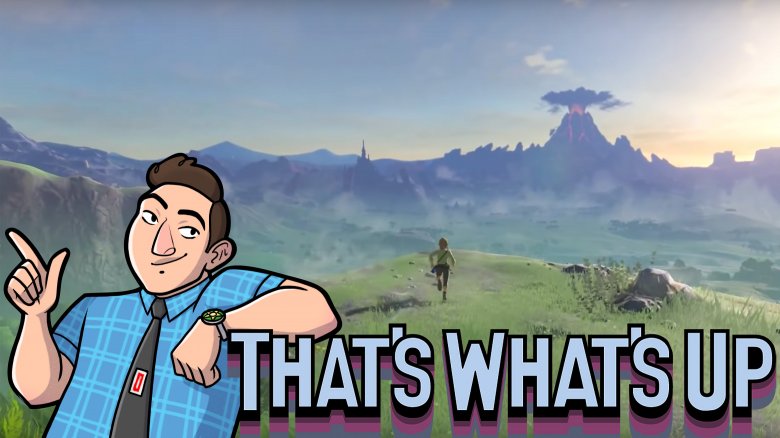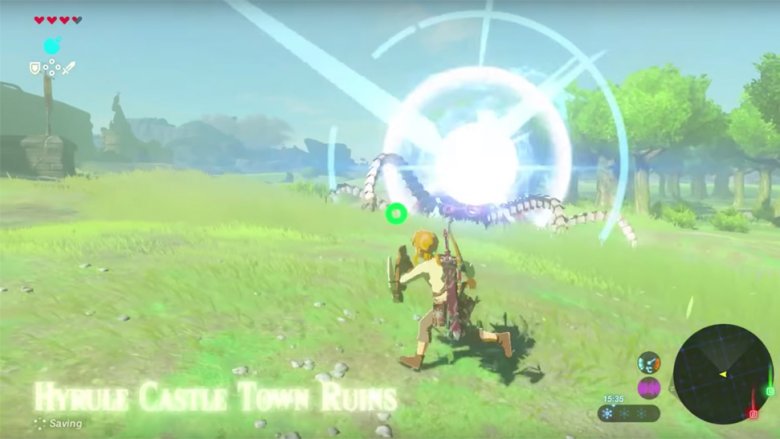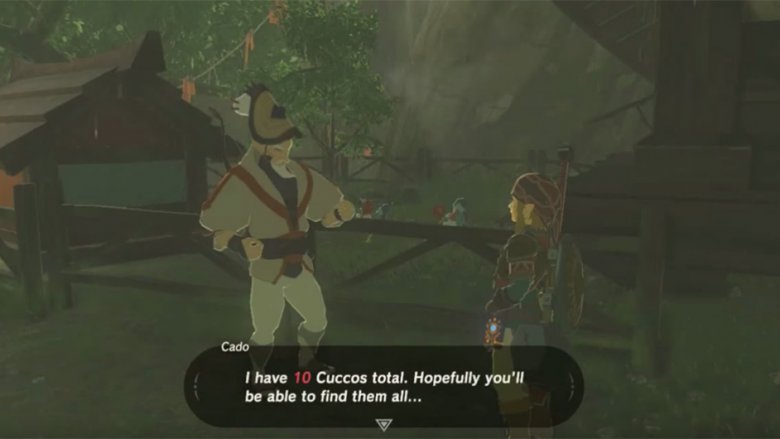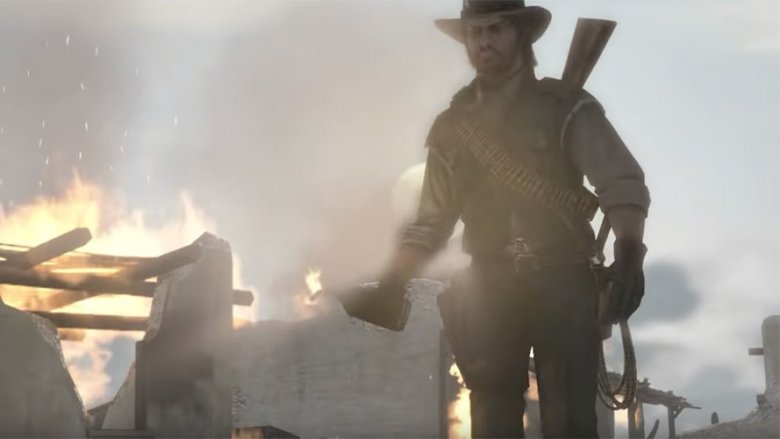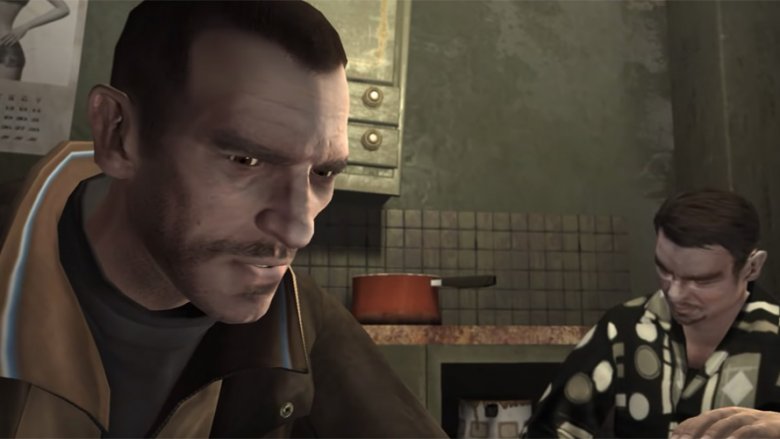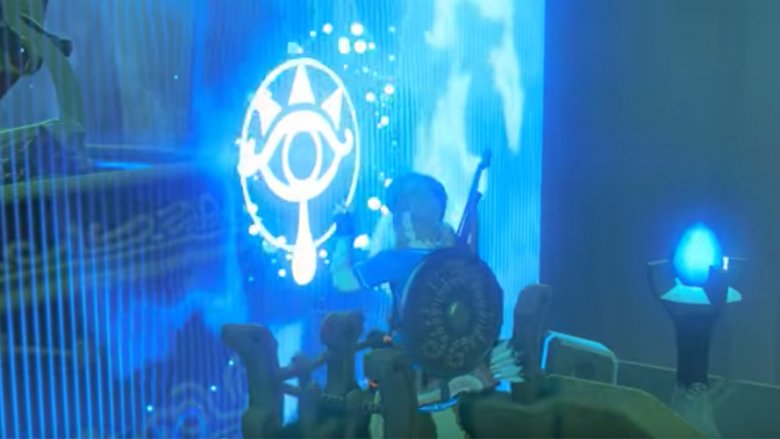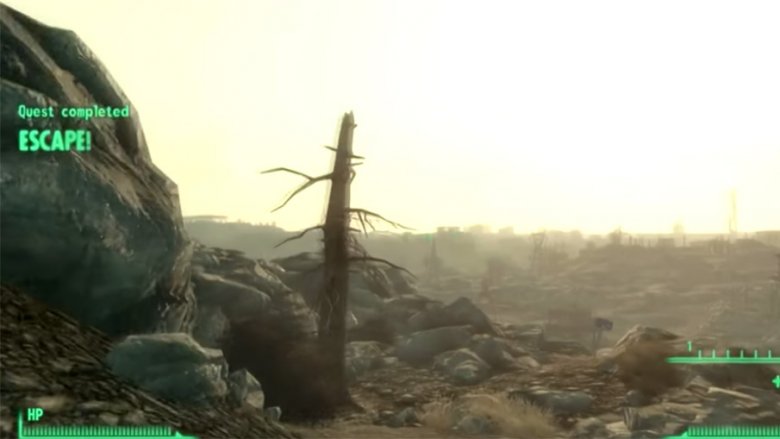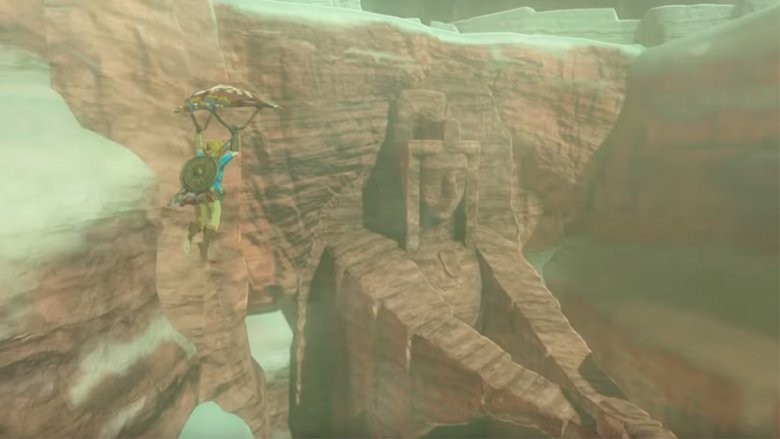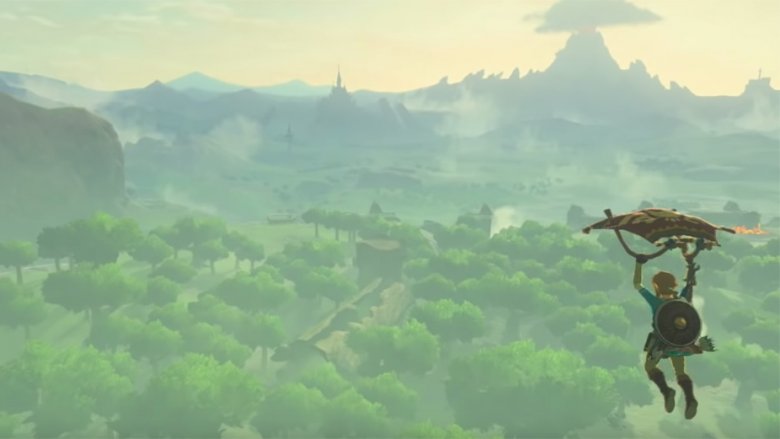That's What's Up: Why Breath Of The Wild Is The Best Open-World Game Ever
Each week, comic book writer Chris Sims answers the burning questions you have about the world of comics and pop culture: what's up with that? If you'd like to ask Chris a question, please send it to @theisb on Twitter with the hashtag #WhatsUpChris, or email it to staff@looper.com with the subject line "That's What's Up."
Q: I saw you mention that Breath of the Wild was your favorite game of the past few years. Is it really that great? — via email
The Legend of Zelda: Breath of the Wild isn't just my favorite recent game. It might actually be my favorite game of all time. That's no mean feat, considering that the two major contenders that it had to dethrone for that title are Castlevania: Symphony of the Night, arguably the single best example of my favorite genre, the Metroidvania, and Saints Row the Third, a game that starts out as a more over-the-top version of Grand Theft Auto and then works its way to the point that Burt Reynolds shows up and asks you to kill a horde of zombies. Given that those two games represent a perfect cross-section of the stuff I'm into, that's are some pretty stiff competition.
Breath of the Wild doesn't have a single mention of Burt Reynolds and sadly, Dracula is completely absent, but it's fair to say that it makes up for those with... well, with everything. The storytelling, the theming, the sheer scope of it, and the way it was built around the simple act of climbing, it all comes together for a staggering experience. I actually think that it might've ruined every other open-world game for me — partly because it fixes the one big problem at the core of their stories.
Open World Blues
I like open world games a lot, which is a good thing since that's pretty much what every triple-A title from Assassin's Creed to Fallout to Spider-Man has become these days. Don't get me wrong, I like a tightly controlled, linear environment, too — the claustrophobic sense of place and isolation that you get in Batman: Arkham Asylum is better than driving around in a Batmobile blowing up drone tanks — but there's something about the thrill of exploration and stumbling into a place where you're not sure you should be.
Really, that's the thing I like about Metroidvanias, which isn't a surprise. Despite their pretty obvious similarities and the fact that they're linked forever in the term for the whole genre, Symphony of the Night wasn't inspired by Super Metroid. Instead, the structure and the idea of items that doubled as keys to new areas was inspired by the original Legend of Zelda. That was the first great open world in video games, and going back to revisit it, you can see how much of it is still in the DNA of the open-world genre. The items-as-keys mechanics, the accessible world that's gated with tougher enemies so that you know you're not supposed to be there (although you can get there if you try), the way you're tantalized with stuff like the docks for the raft, a suggested order for the dungeons that still allows you to complete them in almost any order. All of those are ideas that open world games have revisited over and over again, because they work.
From the moment that you're dropped into that very first crossroads, most of the map is accessible. You don't even have to get the sword before you start exploring, even though the game lures you in with the sight of that cave right at the beginning. Also, we're 23 years out from that game, and I don't know if any intro text is better than someone telling you "It's dangerous to go alone" before sending you off on your journey, alone.
Player vs Character
But as open world games have gotten more complicated and attempted to incorporate complex narratives that match the scope of their environments, they've come up against a problem: what I want to do as a player isn't always what the character I'm playing as wants.
After all, those big open worlds only really work if there's stuff in them, right? You don't want to just wander around looking at things, and if you do, well, there's No Man's Sky, I suppose, and even that has enemies and objectives to complete. The bigger the world, the more stuff it needs to feel complete, and the more stuff there is, the more distractions there are from the actual purpose of being in that world to begin with.
Some games actually do a really great job of making that work, whether it's by tying those side-quests back into the theme or just acknowledging that you're straying from the main quest line. Rockstar's Bully has one of my favorite examples of the latter, where it makes sense to go to classes and get into bike races because you're playing as a teenager, but it all leads to a final level where your arch-enemy is gloating about how he was enacting a plan to take over the school while you were distracted doing everything else. That's a great bit of meta-textual writing that manages to connect you even more to the character, and brings your goals in line with theirs. Unfortunately, not every game can pull that off.
The Marston Imperative
Just take the original Red Dead Redemption, for example — well, not "original," but nobody cares about Red Dead Revolver anymore. The sweeping, open world of that game is arguably its defining aspect and its major selling point, and it's full of side quests. You can hunt animals, track down bounties, tie people up and leave them on railroad tracks, get into horse races, and do all this other stuff that lures you off that critical path.
The problem is that from a storytelling standpoint, that's definitely not what you should be doing. The entire driving plot of that game is based on the idea that John Marston wants to finish doing this dirty work so that he can get back to his wife and son as soon as possible. Unfortunately, that's not what I, the person controlling John Marston, want to do. I want to mess around in the desert looking for buried treasures and getting cryptic messages from the Strange Man. There's a disconnect there, where the whole point of the game, exploring this world and all the stuff in it, separate the player from the character.
That doesn't make Red Dead Redemption a bad game. In fact, I think there's one instance where the disconnect between player and character actually makes the story work, because of how it's constructed. The foreshadowing in that game isn't subtle. Spoiler warning for 2010, but you know pretty early on how things are going to end for John, especially once you get back home and start taking your son through a tutorial of all the skills you used in the game. The thing is, you as a player can choose to stop at any time. If you turn off the game and walk away when the Marstons are reunited, it has a happy ending. It only goes bad if you keep on playing — which of course you're going to do, for the same reason that you did all that animal-skinning and treasure-hunting. Because that's what the game is for. Just like Gary's taunts in Bully, it ties your meta-game actions into the plot, only this time, it makes you, the player, into the ultimate antagonist.
The Bellic Problem
Tying the player/character disconnect into the plot doesn't always work out, though. Grand Theft Auto IV is an amazing game from a technical standpoint, but I found it to be incredibly frustrating, because it played up Niko Bellic's reluctant criminal personality in a way that clashed with what it was asking you to do.
I distinctly remember instances where Niko would make these glum, sad-sack comments about what I was doing in a game that was encouraging me to do these things. When you visit a sex worker in the game to get a bonus health boost, a trick that was been a part of the franchise all through the GTA3 generation, he makes a remark along the lines of "I'm a hired killer who pays for sex. My mother would be so proud." Like, yeah, I get it, you're Good Man In A Bad Situation, but come on, dude. If you don't want me to commit crimes in this game that's literally about committing crimes, then what the heck do you want to do? Is it "hang out with your cousin because family's important"? Because let me tell you, the person playing this game would really rather not. That's one of the reasons Saints Row was so refreshing, because it reveled in the cartoony violence that comes along with being a ruthless criminal and/or puckish rogue.
It's not just a problem with GTA, though. Fable III, a more linear but still open-world game that I otherwise love, is like 40% fetch quests, and you're playing as the literal monarch of this kingdom. Are you sure you can't get your own eggs? I'm trying to prepare for an invasion of absolute darkness here. Skyrim does the same thing, where you can be a master assassin who can shatter a mountain with your very words, and someone's still going to ask you to go find a spoon they lost 40 miles away or whatever. Is this really the best use of my time?
Breath of the Wild and theming
One of the many great things about Breath of the Wild is that it eliminates this conflict almost entirely. Make no mistake, there's a ton of content in this game to go along with the main quest, but unlike other open world games, they're not presented as distractions. Instead, everything about the game is focused on the ultimate goal of taking on Calamity Ganon.
From the start of the game, you are given a tremendous amount of freedom. It has the same in-game map, quest markers, quest log, and guiding hand that's there to move you through the main quest that virtually every open world game has, but once you're done with the opening sequence on the Great Plateau, the customary tutorial to get you familiar with the game's mechanics, the rest of Hyrule is pretty much yours to explore at your leisure. By the time you glide off into the larger world, you have every mandatory item you're going to need to get anywhere in the game. Surviving, on the other hand, is a little tricker, but still. If you want, you can go directly to Hyrule Castle and try to beat Calamity Ganon by smacking him around with a tree branch. You probably won't have much success, and it would be pretty impressive to just sprint across Hyrule Field without getting blown to bits by a bunch of gigantic laser spiders, but it's possible.
And that, right there, is the balance that makes Breath of the Wild work, between possibility and challenge, between getting there and staying there. If you do go straight to Ganon, you'll quickly find that you're out of your depth. The only solution, then, is to get stronger. It's the only way you can destroy Ganon, which is the entry in big yellow letters that's right at the top of your Quest Log for the entirety of the game. As you already know from the four you've been through on the Plateau, the only way to get stronger is by going to shrines, which are hidden all around the world, and occasionally only accessible after weird little side quests. In other words, you get stronger by exploration. You're not just goofing off doing puzzles. You're building yourself up to the hero you need to be.
Fallout: New Hyrule
More than anything else, the opening bits of Breath of the Wild remind me of one of my favorite moments in the Fallout games, and I don't think that's an accident. I haven't heard anyone talk about it, but if I was a betting man, I'd put money down on the idea that BOTW's designers were pretty heavily influenced by Fallout. The degrading weapons, the fact that you're essentially in a post-apocalyptic world that was destroyed in a calamity 100 years ago, the emphasis on strange old technology, the interface of the Sheikah Slate that looks an awful lot like the PipBoy, that's all Fallout stuff. I mean, the game literally opens with exactly the same setup as Fallout 4, with Link coming out of cryogenic stasis and emerging from the fantasy equivalent of a Vault.
It's Fallout 3, though, that has the best connection. The scene where you first step out of Vault 101, when you're blinded by the sun after spending your whole life underground, and then the wasteland around you slowly comes into focus, is one of my favorite moments in any video game, ever. A lot of that has to do with the sheer possibility that you're greeted with. There's a not-so-subtle guiding hand, of course — if you go straight down the trail from the Vault, you'll find a ramshackle sign pointing you to the village of Megaton where you can continue the main quest of reclaiming your lost Liam Neeson — but you don't have to follow it. There's nothing stopping you from wandering off in any other direction and seeing what's out there.
The really neat thing, though, is that if you do wind up following that critical path to Megaton, the game illustrates your freedom in another way. One of the first choices you're given in the entire game is whether to blow up the entire settlement. It's not terribly difficult, and doing so doesn't really lock you out of anything; you can even still take Moira's Wasteland Guide quests after you blow her up thanks to the cartoony magic of video game radiation. It is, however, one of the few things in the game that has a massive and lasting impact on the world: you can take away a major settlement, a home base, and a handful of major NPCs, and — just to reiterate here because I cannot stress this enough — it's the first real decision you're likely to encounter as you continue the main quest.
Traversal and travail
The other thing that BotW does incredibly well is making traversal fun. As much as I love Fallout, for example, actually getting from place to place can be a slog, which is why you're way more likely to just use fast-travel instead. That means that you're only really seeing the world when you're exploring, looking for new places that you can use as fast travel points, and I think that's kind of a shame. The PS4 Spider-Man game, though — my favorite title of the year — has a fast travel option that comes complete with really funny scenes of Peter Parker, in costume, riding the subway, but Insomniac made web-swinging from place to place so fun that I think I only used it once in my entire playthrough.
The same goes for Zelda. There are fast travel options, and honestly, there should be, because the world map you're dealing with is absolutely massive, but they're relatively spaced out. The tradeoff is that they made traversal fun, both in the mechanics, and in the way that you're always exploring. There's a verticality to BotW that's really only matched by Spider-Man, where climbing is the defining action. In a genre that almost always uses mountains and cliffs to mark the edges of where you can and can't go, Link scrambles up walls in a way that puts Ezio Auditore to shame.
There's something else, though: Breath of the Wild makes you want to traverse its map. It's loaded with beautiful landmarks and mysterious ruins that tell a story through atmosphere. There are huge skeletons of prehistoric beasts, rock formations that only look like something when you view them from a certain angle, ancient citadels carved into literal mazes, battlefields overgrown with plants, and so on. I remember poking around the snowy mountains at the southern edge of the map and just stumbling across this huge statue, tucked away in a snowy crevice. Later, I'd learn that it was the Eighth Heroine and that there's a little side-quest built around finding it, but encountering it the way I did made this world feel ancient and mysterious in a way that very few games can pull off.
Get on Link's level
Listen, I could go on for hours about this stuff. I love the shift away from the sprawling dungeons that have come to define Zelda games in previous generations in favor of a ton of smaller, hyper-focused challenges that often have multiple solutions, the design of the Great Beasts is flat-out phenomenal, and, you know, I'm pretty stoked about the DLC that gives you a magic dirtbike that runs on dead monsters, too. The thing is, those are the elements that make Breath of the Wild a great Zelda game.
It's that other stuff, the way it encourages exploration in a world that feels like it's more than just a set of level-appropriate challenges, the way it emphasizes scale and tantalizes you with something just a little further than where you've already been, that make it a great open world game. Simply put, it took everything you've seen in Fallout, Skyrim, and even a little Assassin's Creed and mixed them all into something that was more fun.
The only thing wrong with it is that they didn't put in a New Game Plus option.
Each week, comic book writer Chris Sims answers the burning questions you have about the world of comics and pop culture: what's up with that? If you'd like to ask Chris a question, please send it to @theisb on Twitter with the hashtag #WhatsUpChris, or email it to staff@looper.com with the subject line "That's What's Up."

